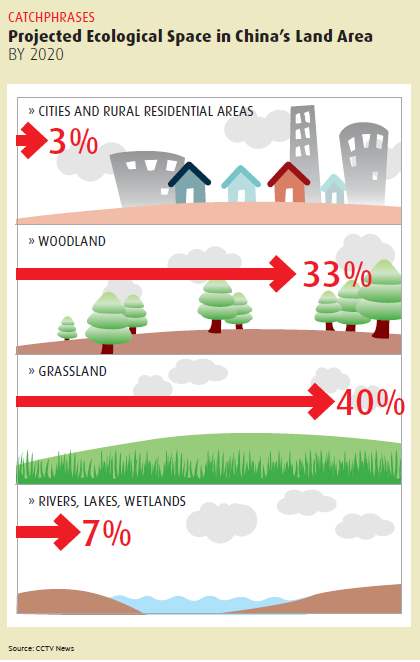CPC Catch Phrases: Ecological Products
CHINAFRICA, February 4, 2013 Adjust font size:
The Report to the 18th National Congress of the Communist Party of China (CPC), made by then Party General Secretary Hu Jintao on November 8, 2012, laid out a blueprint for China's future. A comprehensive insight into the key terms in this report will help readers better understand the country's national strategies and its future path. Starting this month, ChinAfrica will introduce one key term in each issue.

Ecological Products
The ecological products mentioned in the report do not refer to the green products that people can buy in supermarkets. The term refers to fresh air, clean water, and a healthy environment and climate, all of which depend on natural habitats, including forests, grasslands, rivers, lakes, wetlands and other ecological spaces.
To produce more of such "ecological products," it's necessary to have sufficient ecological space. According to the national functional zoning strategy, issued by the State Council in 2010, China is set to guarantee its arable land never shrinks to less than 120 million hectares. In addition, by 2020, cities and rural residential areas in China will be controlled to occupy less than 3 percent of its total land area.
In contrast, the green spaces crucial to securing the nation's ecological products will be expanding. Woodland will increase to 3.12 million square km, accounting for almost one third of China's total land area, while over 40 percent of the area will remain covered by grasslands. With addition of rivers, lakes, and wetlands, the total ecological spaces will exceed 80 percent of the country's territory.
The ecological products that people need most will be produced in these ecological spaces. The Qinghai-Tibet Plateau, Loess Plateau, the forest belts in the northeast, sand prevention belts in the north, and hills in the south will all become regional ecological security barriers. The 25 national key ecological zones will help with conservation of the country's large rivers, climate regulation, soil and water conservation, and disaster mitigation. In the future, China will not only continue to be a major manufacturing nation, but will also be an important ecological country rich in ecological products.

